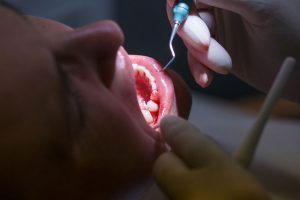Toothache During Pregnancy: How to Avoid Such Pain
 Pregnancy has an impact on many different aspects of a woman’s life. This includes their oral health. It is very common for certain women to develop tooth and gum pain, as well as other dental problems during pregnancy. This is typically due to hormonal changes which happen to women while they are pregnant. Certain women are more susceptible to tooth pain and/or other oral health issues while they are pregnant. The types of oral health issues a pregnant woman may experience depend on their hormonal changes as well as their overall oral health before becoming pregnant.
Pregnancy has an impact on many different aspects of a woman’s life. This includes their oral health. It is very common for certain women to develop tooth and gum pain, as well as other dental problems during pregnancy. This is typically due to hormonal changes which happen to women while they are pregnant. Certain women are more susceptible to tooth pain and/or other oral health issues while they are pregnant. The types of oral health issues a pregnant woman may experience depend on their hormonal changes as well as their overall oral health before becoming pregnant.
Hormonal changes and increased blood flow can cause expecting mothers to have swelling, irritated and bleeding gums. In addition to hormonal changes during a woman’s pregnancy, tooth decay or tooth sensitivity can also lead to tooth pain and other dental problems. Women’s mouths are also more acidic while they are pregnant due to vomiting which can damage their tooth enamel. During pregnancy, women are also at risk for tooth decay due to food cravings and changes in their diet. This is why, even though you most likely don’t need dental treatment, it is extremely important to maintain a strict oral hygiene routine during pregnancy to ensure that you and your unborn child are not at risk.
If you notice a problem or experience pain in your teeth while you are pregnant (this can include inflamed and bleeding gums, increased tooth sensitivity, and more), consult with your dentist before your baby is born. If your oral hygiene routine has been impacted because of stress and you are not brushing twice a day and flossing once daily, you can become even more susceptible to cavities and other oral health issues.
What Are Common Symptoms of Tooth Pain During Pregnancy?
 If you are pregnant and experience the following symptoms, schedule an appointment with your dentist immediately to rule out any oral health issues which could put you or your unborn child at risk:
If you are pregnant and experience the following symptoms, schedule an appointment with your dentist immediately to rule out any oral health issues which could put you or your unborn child at risk:
- Bleeding gums
- Dry mouth
- Inflammation
- Tooth pain
- “Pregnancy tumor” on tooth: swollen gum tissue between teeth resulting in bleeding
- Loose teeth: hormones may affect the ligaments which hold your teeth to its bone.
How Do I Avoid Toothache During Pregnancy?
There are many things a woman can do to avoid tooth pain during pregnancy. This includes maintaining a good oral hygiene routine as well as using preventative measures like regular checkups before pregnancy to ensure that your oral health is in good shape. Some other ways to avoid tooth pain during pregnancy include:
- Visiting your dentist for more frequent checkups and cleanings
- Brushing and flossing regularly
- Avoiding brushing immediately after vomiting
- Using an antimicrobial mouthwash
- Eating a well-balanced diet
- Avoiding excessive eating of sugary snacks
- Rinsing your mouth with salt water
A dentist will likely recommend a course of action to help prevent and treat tooth pain but there are also several at-home, natural remedies that you can use to help both prevent and treat tooth pain.
If you experience tooth pain while you are pregnant, here are some remedies which can help reduce your pain and get you back on the right track:
- Over-the-counter pain relief medication such as acetaminophen (always consult your doctor before taking any type of medication)
- Rinse your mouth with warm water after every meal. You can also add salt to your warm water rinse to help reduce pain and eliminate foot particles stuck in your teeth.
- Floss and brush regularly
- Over-the-counter antiseptics can be used to provide temporary pain relief by numbing the gums. Consult your doctor first
- Rebalance the acidic content in your mouth after vomiting by rinsing your mouth with baking soda and water
- A warm or cold compression can temporarily relieve tooth pain. Apply a warm or cold washcloth to your face where you are experiencing pain
Contact Your Dentist Today

Pregnant women are very susceptible to toothache and other oral health issues while they are pregnant. This is because of hormonal changes which occur during pregnancy, changes in diet, a lackluster oral hygiene routine, and a multitude of other factors. To avoid toothache during pregnancy, it is extremely important to start prevention early on by going to regular dental checkups even before you are pregnant. The American Dental Association states that patients should go for regular dental checkups at least once every six months. This can help prevent any future issues that may occur while you are pregnant.
To avoid any possible tooth pain or other oral health issues during pregnancy, you should ensure that you maintain a good oral hygiene routine. Brushing twice daily and flossing once a day is extremely important and can help prevent possible oral problems while you are pregnant. If you experience morning sickness during your pregnancy, be sure to avoid cleaning your teeth after vomiting. And as tempting as cravings may be, be sure to watch your diet. Make sure that your diet is well balanced and that you avoid eating too much sugar, which can lead to cavities and potential decay.
If you notice any oral health issues during your pregnancy, be sure to contact your dentist immediately. Don’t wait until your baby is born, as this can cause more complex oral health issues down the road.
Speak to your dentist about any issues you may be experiencing while you are pregnant. If you have any questions or concerns about your oral hygiene while you are pregnant, you can also address these issues with your dentist. Enjoy your pregnancy the best you can by visiting your dentist the moment you start noticing any problems in your oral health.
Your oral health is a huge part of your overall health as well as your baby’s health. For a safe pregnancy, make your oral health a priority and visit your dentist the moment you experience any type of oral health issues.
Relate Posts to Read:
Toothache and Earache at the Same Time? Here’s Why.
